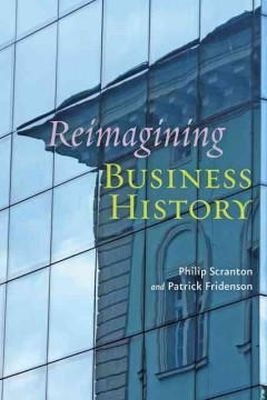
Stock image for illustration purposes only - book cover, edition or condition may vary.
Reimagining Business History
Philip Scranton
€ 35.92
FREE Delivery in Ireland
Description for Reimagining Business History
Paperback. How can this field develop in an age of global markets, growing information technology, and diminishing resources? A transnational collaboration between two senior scholars, Reimagining Business History offers direction in forty-four short, pithy essays. Num Pages: 254 pages, 1, 1 black & white line drawings. BIC Classification: HBJK; KCZ. Category: (U) Tertiary Education (US: College). Dimension: 230 x 153 x 18. Weight in Grams: 376.
Business history needs a shake-up, Philip Scranton and Patrick Fridenson argue, as many businesses go global and cultural contexts become critical. "Reimagining Business History" prods practitioners to take new approaches to entrepreneurial intentions, company scale, corporate strategies, local infrastructure, employee well-being, use of resources, and long-term environmental consequences. During the past half century, the history of American business became an unusually active and rewarding field of scholarship, partly because of the primacy of postwar American capital, at home and abroad, and the rise of a consumer culture but also because of the theoretical originality of Alfred D. Chandler. In a field long given over to banal company histories and biographies of tycoons, Chandler took the subject seriously enough to ask about the large patterns and causes of corporate success. Chandler and his students found the richest material for theorizing about the course of business history in large companies and their institutional structures and cultures. Meantime, Scranton and others found smaller firms, those specializing in batch work as opposed to mass-produced goods, far closer to the norm and more telling. Scranton and Fridenson believe that the time has come for a sweeping rethinking of the field, its materials, and the kinds of questions its practitioners should be asking. How can this field develop in an age of global markets, growing information technology, and diminishing resources? A transnational collaboration between two senior scholars, "Reimagining Business History" offers direction in forty-four short, pithy essays.
Product Details
Publisher
Johns Hopkins University Press United States
Number of pages
254
Format
Paperback
Publication date
2013
Condition
New
Number of Pages
254
Place of Publication
Baltimore, MD, United States
ISBN
9781421408620
SKU
V9781421408620
Shipping Time
Usually ships in 15 to 20 working days
Ref
99-50
About Philip Scranton
Philip Scranton is University Board of Governors Professor, History of Industry and Technology, at Rutgers University and editor-in-chief of the journal Enterprise and Society. Patrick Fridenson is emeritus professor of international business history at the Ecole des Hautes Etudes en Sciences Sociales in Paris and founding editor of Entreprises et Histoire. Both are former presidents of the Business History Conference.
Reviews for Reimagining Business History
Reimagining Business History belongs in American history and business collections alike and provides new approaches to understanding the evolution of companies, corporate strategies, and resources. Midwest Book Review An important and provocative book, not only in terms of business history but also in terms of the wider discipline, as the authors' plea for greater interaction with other historians.
Joe Martin American Historical Review I really hope that business historians will read this book, because it is apt to open new roads and strengthen the discipline in such a way as to make of it a more assertive component of the larger field of "Economic History," which cannot be left only to macro-econometricians.
Vera Zamagni EH.Net
Joe Martin American Historical Review I really hope that business historians will read this book, because it is apt to open new roads and strengthen the discipline in such a way as to make of it a more assertive component of the larger field of "Economic History," which cannot be left only to macro-econometricians.
Vera Zamagni EH.Net
